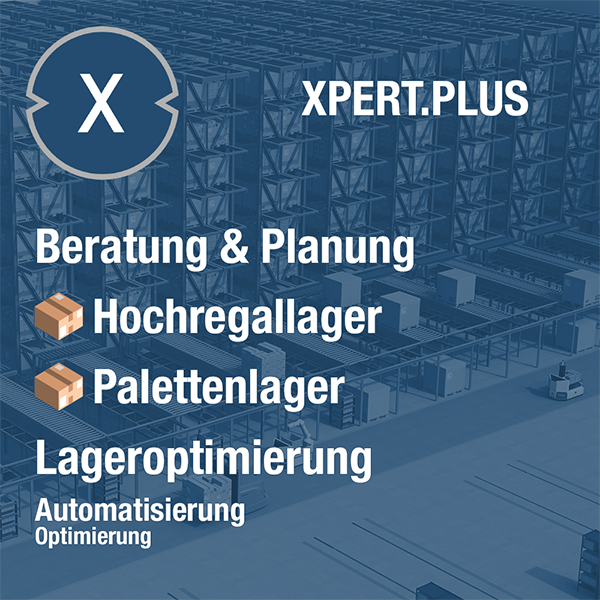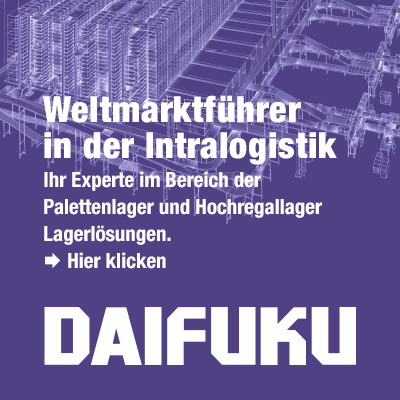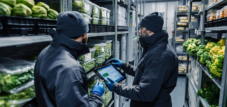The market for cooling logistics in Egypt: growth, challenges and opportunities of a booming industry
Xpert pre-release
Language selection 📢
Published on: July 1, 2025 / update from: July 1, 2025 - Author: Konrad Wolfenstein

The market for cooling logistics in Egypt: growth, challenges and opportunities of a booming industry - Image: Xpert.digital
Egyptian cooling logistics market exceeds expectations with double -digit growth rates
Overview of the Egyptian cooling logistics market
The market for cooling logistics in Egypt is currently experiencing a remarkable development with exceptional growth rates that make the country a logistics in the MENA region. According to current market analyzes, the Egyptian cooling logistics market is expected to expand with an annual growth rate of 11.97 percent by 2033, which makes it one of the fastest growing sectors in the regional logistics landscape.
This impressive growth dynamics are powered by several interacting factors. The market is expected to increase from $ 498.43 million in 2025 to significantly higher values in the coming years. Various studies predict different growth rates, with the range between 5.5 percent and over 11.97 percent annually, which reflects the dynamic nature of this sector.
Suitable for:
Structure and segmentation of the market
The Egyptian cooling logistics market shows a diverse structure with different segments that have different growth rates. The segmentation is mainly based on service types, temperature categories and areas of application.
Service segments
The cooling logistics industry in Egypt is divided into three main services: warehousing, transport and added value. The warehouse segment dominates the market and includes facilities for preserving perishable goods. These facilities are crucial for maintaining the integrity and quality of products, including food and pharmaceuticals, during the entire supply chain.
The transport area plays an equally important role, with a considerable lack of small -scale refrigerated transport solutions. Currently, only large -scale refrigerated transport is available in Egypt and is used by large companies that serve international food processors or the export market. Small farmers suffer from a competitive disadvantage due to their inability to use refrigerated transport because it is not available on a small level.
Added value services such as shocking, labeling and inventory management also gain in importance and increase the overall market value. These services develop into an important differentiation feature for companies in the cooling logistics sector.
Temperature categories
The temperature categorization of the market comprises three main areas: cooled products (0 ° C to 15 ° C), frozen products (-18 ° C to -25 ° C) and frozen products (below -25 ° C). The segment of frozen products typically keeps a larger market share due to the extensive demand for frozen food products in Egypt.
Areas of application
The largest area of application for cooling logistics in Egypt is the fruits and vegetables segment, which includes the widest range of perishable goods with high demand. This reflects Egypt's agricultural production and its importance for the national economy. Other important segments include dairy products and frozen desserts, pharmaceuticals, processed foods as well as meat, fish and seafood.
Driving forces of market growth
Expansion of the agricultural and food sector
Egypt's agricultural sector is a fundamental pillar of the national economy and contributes around 12 to 15 percent to the gross domestic product. The sector absorbs more than 25 percent of the country's workers and maximizes the foreign exchange reserves by increasing agricultural exports. This strong position in agriculture creates a natural demand for efficient cooling chain solutions.
Egypt has established itself as Europe's second largest exporter of fresh fruit and vegetables and delivered 917,000 tons of products in the 2023-2024 season, which corresponds to growth of 7 percent compared to the previous year. Citrus fruits exported with 500,000 tons, followed by sweet potatoes with 117,000 tons and onions with 94,600 tons.
The government has ambitious plans for the expansion of the agricultural area through land extraction projects such as the “one and a half million feddan project”, the “new Delta project” and the “Toshka project”. These projects will lead to an increase in the market offer, which requires a significant increase in cooling chain solutions.
Growth of the pharmaceutical sector
The pharmaceutical industry in Egypt grows continuously and thus increases the need for temperature -managed logistics. This is particularly important for the transport of sensitive products such as vaccines and biologicals. Companies such as DHL Egypt expand their cold chain systems to ensure the safe delivery of medical care goods.
During the Covid 19 pandemic, the cooling chain logistics proved to be crucial for the distribution of vaccines, which illustrated the importance of the sector. Investments in specialized storage facilities and real-time monitoring systems help logistics providers to meet strict regulations and to ensure safe transport of life-saving medication.
E-commerce and retail boom
The rise of e-commerce and organized retail in Egypt reinforces the cooling chain logistics. Online food platforms grow, and consumers want to deliver fresher and frozen products. Companies such as Logistica react to this by offering load-mile deliveries with refrigerated vehicles.
Super markets and consumer markets rely on reliable supply chains for fresh goods, which increases the need for cooling and transportation. In cities like Cairo, good logistics helps to keep dairy products and frozen food fresh.
Suitable for:
Technological developments and innovation
Progress in surveillance technology
Advanced technologies are fundamentally changing Egyptian cold chain logistics market. IoT monitoring systems and real-time temperature tracking are now standard and ensure product integrity during transport. For example, ACS Logistics uses Co. IoT solutions for monitoring cooling containers, which reduces the perishable risks for perishable goods such as seafood.
In addition, new cooling technologies such as energy -efficient cooling systems help companies reduce costs and at the same time maintain quality. This progress increases reliability and correspond to global standards, which helps Egyptian logistics providers to compete better internationally.
Energy efficiency and sustainability
The introduction of solar pump systems shows promising results in reducing combined water and energy consumption by 28.1 percent compared to conventional diesel pumps. This is an important advantage because the energy subsidies are eliminated. The amortization period continues to shorten when IoT sensors synchronize water delivery with evapot transiration rates.
Precision irrigation programs that cover 4 million feddan promise 20 percent efficiency gains in water consumption. These developments are particularly important for cold chain logistics because they help to lower operating costs and improve sustainability.
Challenges and problems
Infrastructure deficits
Despite the progress in the cold chain infrastructure, Egypt faces several challenges that affect efficiency and effectiveness. While urban centers and important agricultural regions have appropriate cooling bearings, rural areas often lack access to such infrastructure. This represents challenges for small -scale companies and producers in these regions to store and transport their perishable goods under the necessary temperature conditions.
The cooling bearing capacity in Egypt was 0.085 cubic meters per city dweller in 2018 and in 2020 was reduced to less than 0.005 cubic meters per capita, while the worldwide average of 2020 was 0.15 cubic meters per city inhabitant. The average size of the cooling stores in Egypt is 6,200 cubic meters, which only corresponds to six percent of the capacity in the Netherlands and seven percent of the capacity in Peru and Mexico.
Energy costs and reliability
Cool storage devices are heavily dependent on electricity in order to maintain proper temperature control. However, the energy costs in Egypt can be high and the reliability of the power supply is not always guaranteed. Fluctuations or failures can endanger the integrity of perishable goods and lead to the deterioration in quality and possible spoilage.
The challenges in energy supply are reinforced by the fact that the cooling chain logistics require continuous and stable energy flow. Interruptions can have catastrophic effects on the stored products, which leads to considerable financial losses.
Lack of technical expertise
The proper handling, storage and transport of temperature -sensitive goods require specialized technical knowledge and expertise. However, there is a lack of trained specialists in cooling chain management in Egypt. This gap prevents the assumption of proven practices and the optimal use of the cooling chain infrastructure.
Access for small and medium -sized companies
Most packing stations and cooling stores are mostly privately owned and mainly accessible to large aggregators and multinational companies. The majority of farmers in Egypt, small -scale businesses, cannot access cooling chain solutions, mainly due to the high costs of the solutions. The agricultural production of the small -scale businesses is limited, so the generated income is not sufficient to buy and access cooling solutions.
Xpert partner in warehouse planning and construction
Upper Egypt vs. Unterägypt: The unequal distribution of the cooling logistics infrastructure
Loss of perishable were
Extent of the after -harvest losses
Egypt faces considerable challenges in the post -harvesting rate of perishable goods, which are mainly due to inadequate cold chain infrastructure. The problem of food losses and waste is particularly serious, since almost a third of global food production is wasted.
For wheat, one of the most important staples of Egypt, the total loss from the farm to consumers is 20.6 percent, which corresponds to 4.4 million tons. The greatest losses occur in the harvest (9.3 percent) and during plant growth (8.2 percent). Further losses arise during marketing (4.3 percent) and storage (4 percent).
When rice, 25 percent of the grains are lost after the harvest, mainly during the thermal bath. Around 12 to 15 percent of wheat production are also lost, but mainly through pests, improper storage and unsuitable transport. The overloading of transport vehicles is a common cause of post -harvest losses in Egypt in many other cultures.
Losses of fruit and vegetables
The losses in fruit and vegetables are particularly dramatic and an estimated 45 to 55 percent of annual production in the entire MENA region. Priority data for projects appreciate quantitative losses of over 45 percent in grapes and over 50 percent in tomatoes solely in the production, retail and wholesale levels of the value chain, together with serious loss of quality.
These enormous losses occur in different levels of the value chain:
- Production and harvest: Cultures are damaged, squeezed or left behind in the fields due to poor harvest handling practices and poor harvest skills. Cultures are sorted out for lack of awareness of standards and quality.
- Storage: quality deterioration and pest/disease infestation due to insufficient storage facilities and techniques.
- Transport and sales: Damage and burials during transport due to inadequate transport and sales systems.
- Wholesale and retail markets: spilled or damaged cultures and products on markets due to insufficient infrastructure and poor handling.
Economic effects of the losses
The economic effects of these losses are significant. An estimate of 10 percent after-harvesting in all in Egypt domestically produced and imported wheat, corn and rice quantities would correspond to the loss of 3.9 million tons of grain per year, which corresponds to $ 1.16 billion or the annual calorie requirement of at least 15 million people.
For wheat alone, the losses imply the waste of 4.8 billion cubic meters of water and 74.72 million gigajoule energy (corresponds to 2.3 billion liters of diesel). If Egypt manages to eliminate wheat -related losses and waste significantly, it could save enough food to feed 21 million other people from domestic production and thus reduce wheat imports by 37 percent.
Egypt sees an average of 91 kilograms of wasted food per capita and year, with almost two thirds of food losses occurring during production, handling, processing and distribution. A significant part of these losses arises from inadequate cooling and transport systems.
Suitable for:
- Cold Chain Logistics Strategies: For more sustainable cold logistics and frozen logistics in global industrial logistics
Regional disparities and development potential
Concentration on lower Egypt
Most cold chain and food processing activities in Egypt concentrate on Unterägypt, the region, which is more than 70 percent of gross production of food processing. Although Oberägypt plays a key role in primary agriculture and contributes around 30 percent to agricultural gross production, it is faced with great unused potential for both cold chains and food processing.
Development initiatives
Various initiatives were started to tackle these regional disparities. The government has assigned 62.4 billion Egyptian pounds for Upper Egypt in the current budget year, with 11 percent being intended for Minya. In addition, 43.2 billion Egyptian pounds in Minya were invested in various sectors under the first phase of the presidential initiative “worthy life”.
Innovative project developments
An important development project is the Sullex TRC city, Egypt's first intelligent temperature-led logistics city for production and trade in chilled and frozen food products. The 150 million dollar project extends over an area of 510,000 square meters in the Giza governorate and aims to become a regional center for manufacturing and trading with frozen agricultural products, pharmaceuticals and cooled products such as meat, poultry and dairy products.
The city will include around 60 cooled and frozen food factories with areas from 1,250 square meters and 13 intelligent temperature -run bearings with storage capacities of up to 10,000 pallets. The project aims to save more than 30 percent of the losses in agricultural products that are traded in Oberägypt due to a lack of reasonable cooling warrant.
Export potential and international markets
Growing export performance
Egypt's position as Europe's second largest exporter of fresh fruit and vegetables underlines the considerable potential for further expansion of cold chain logistics. The success of orange exports was particularly remarkable, with exports to the EU almost doubled and reached over half a million tons for the first time in 2023.
This remarkable success was mainly driven by the increase in orange exports from Egypt to the EU, as a result of the severe drought that affected the main orange producers in the region. During the 2022/23 season, the EU orange production of the EU fell to the lowest level for a decade, which created an enormous demand for oranges from non-EU countries.
Diversification of the export products
Egypt's export palette includes a wide range of fruit and vegetables, including carrots, lemons, garlic, beans, mangoes, peppers, strawberries and watermelons. This diversification shows the potential for further expansion of the cold chain infrastructure to support various product categories.
The Netherlands remained the most important trading partner in the EU market with 254,000 tons, followed by Spain with 103,000 tons. Together, these two countries made about two thirds of Egypt's total fresh fruit exports to the EU.
Investment options and future prospects
Private sector engagement
The Egyptian cooling logistics market offers considerable investment options, especially for private companies. The government is promoting public-private partnerships to promote investments in the cooling chain infrastructure and to facilitate the establishment of other storage facilities in under-supplied regions.
Companies are already investing in modern cooling systems and technologies. For example, established actors such as Multi Fruit Egypt have invested in modern cooling devices to support exports to Europe and Asia and to ensure freshness and compliance with international standards.
Technology adaptation
The introduction of advanced technologies can revolutionize Egyptian cold chain industry. Internet-of-Things sensors and temperature monitoring systems can provide real-time data for temperature, moisture and other critical parameters. This data can enable proactive monitoring, timely interventions and quick response to temperature deviations.
In addition, data analysis and machine learning can help optimize cooling chain operations, improve the forecast accuracy and reduce waste. The implementation of warehouse management systems and automation can optimize functionality, increase efficiency and reduce operating costs.
Government initiatives
The government has implemented regulations and standards to ensure compliance with food safety requirements during the entire cold chain. These regulations include aspects such as temperature monitoring, proper handling practices and storage conditions. The strict enforcement of these regulations promotes food safety and strengthens consumers' trust.
Investments in training programs and capacity structure initiatives are crucial for the improvement of the technical skills of specialists who work in the cold chain. These programs can concentrate on cooling chain management, temperature control, quality assurance and food safety practices.
Environmental and sustainability aspects
Reduction of environmental impacts
Improved cold chains can contribute significantly to reduce the environmental impact. Food losses and waste in Egypt have a significant CO2 footprint and lead to almost 500 kilograms of CO2 equivalent emissions per capita and year. This contributes to climate change and does not yet take into account the greenhouse gas emissions from the energy infrastructure of the food value chains and HFC emissions from the existing cold chain.
If Egypt manages to significantly reduce food losses, it could reduce emissions of at least 260.84 million kilograms of CO2 equivalent and 8.5 million kilograms of methane. This would make an important contribution to the global climate goals.
Water resource conservation
Reducing food losses through improved cold chains can also contribute to maintaining scarce water resources. The overall food losses in wheat lead to the waste of 4.8 billion cubic meters of water. In a low -water country like Egypt, which depends heavily on the Nile, the preservation of this resource is of crucial importance.
The introduction of solar pump systems and energy-efficient cooling systems can help to reduce both energy and water consumption. Field tests show that solar pump systems can reduce the combined water and energy consumption by 28.1 percent compared to conventional diesel pumps.
Suitable for:
- From buffer storage for fresh logistics and refrigerated logistics warehouses to automated AI high-bay warehouses and pallet warehouses
From Cairo to Europe: How Egypt has to transform its cold chain infrastructure
The Egyptian cooling logistics market is at a turning point with enormous growth potential and at the same time considerable challenges. With a forecast annual growth rate of 11.97 percent by 2033, the market offers attractive investment opportunities for both local and international companies.
The main drivers for this growth are the expansion of the agricultural and food sector, the growth of the pharmaceutical industry, the e-commerce boom and the increasing demand for high-quality, fresh products. Egypt's position as an important exporter from fruit and vegetables to Europe increases the need for efficient cooling chain solutions.
However, the challenges are considerable and include infrastructure deficits, high energy costs, lack of technical expertise and limited access for small and medium -sized companies. The loss rate of perishable goods remains alarming, with losses of 20 to 50 percent in various product categories.
In order to realize the full potential of the market, coordinated efforts are required to include the government, private sector and international organizations. Investments in modern infrastructure, technology adaptation, capacity structure and sustainable solutions are crucial for the development of a robust and efficient cooling logistics system.
The future of Egyptian cooling logistics depends on how successfully these challenges can be mastered while the enormous growth opportunities are used at the same time. With the right investments and strategies, Egypt can further strengthen his position as a leading actor in regional cold chain logistics and make an important contribution to global food safety.

Xpert.Plus warehouse optimization - high-bay warehouses such as pallet warehouses consulting and planning
We are there for you - advice - planning - implementation - project management
☑️ SME support in strategy, consulting, planning and implementation
☑️ Creation or realignment of the digital strategy and digitalization
☑️ Expansion and optimization of international sales processes
☑️ Global & Digital B2B trading platforms
☑️ Pioneer Business Development
I would be happy to serve as your personal advisor.
You can contact me by filling out the contact form below or simply call me on +49 89 89 674 804 (Munich) .
I'm looking forward to our joint project.
Xpert.Digital - Konrad Wolfenstein
Xpert.Digital is a hub for industry with a focus on digitalization, mechanical engineering, logistics/intralogistics and photovoltaics.
With our 360° business development solution, we support well-known companies from new business to after sales.
Market intelligence, smarketing, marketing automation, content development, PR, mail campaigns, personalized social media and lead nurturing are part of our digital tools.
You can find out more at: www.xpert.digital - www.xpert.solar - www.xpert.plus






























